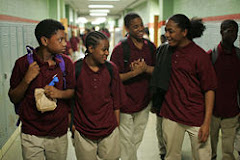World Literature / Works in Translation:
Theme: Something about the aftermath of war
1. The House of the Spirits by Isabell Allende
(Aug/Sept)
2. The Unbearable Lightness of Being by Milan Kundera
(Oct)
3. No Exit by Sartre (Nov)
School's Free Choice
Theme: Male Angst and its Consequences
4. The Wind-Up Bird Chronicle by Haruki Murakami (Dec-Jan)
5. The White Boy Shuffle by Paul Beatty
(Jan-Feb)
6. Frankenstein by Mary Shelley (Feb-March)
7. King Lear by Shakespeare (March-April)
Brief explanations:
#1: Funny, lively, epic novel. Introduces magical realism. Female author, lots of strong female characters. Students generally like it.
#2: None yet, except that it's a well-renowned novel and is on the World Lit list.
#3: Haven't read it, but have heard it's a good introduction to existentialism. Plus, it's nice to do a short, modern drama.
#4: Students generally love Murakami, and I think they'd really latch onto his novel. Now, it's 600 pages or so, but hopefully the students will enjoy it as much as they did his short stories (we've taught The Elephant Vanishes for years).
#5: Funny and smart satire about race with which a lot of our students will connect. The troubling Huck Finn shouldn't be the only satirical novel about race that they read. Paul Beatty could be the next great novelist; he's a superb poet. Though this is a risky teach, students will find it fresh and very funny.
#6: 19th century, female. I've never taught another 19th century novel that the kids were so into. Page-turner. Good introduction to Romanticism. Very accessible and not overwhelming in terms of structure. Plus, one of the signs of an educated person is knowing that Frankenstein was the doctor, not the creature. (Note: I usually am not in favor of the "English teacher as gatekeeper" argument, and have never been one to say that "all high school students must read __________", but, geez, this little fact is one that I think everyone should know. Plus, that "Wherefore art thou, Romeo?" does not mean "Where are you, Romeo?")
#7: I think the family drama, the question of fairness, and the themes of remaining true to yourself and to others will resonate with students. Honestly, I've never experienced such a page-turner as this one when reading Shakespeare. Kids at our school read Romeo and Juliet their 9th grade year and some combination of Hamlet, Macbeth, and The Tempest their 12th grade year. Still light on comedies, but I've yet to find a Shakespeare comedy that I much liked (the first two acts of Romeo and Juliet are a comedy, anyway). The last reason I wanted it on the curriculum is that I think I can teach the hell out of it, as a result of the Teaching Shakespeare Institute.
#2 and #3 are my colleague's choices - I haven't read them yet and could nix them.
#5 was my idea but she's all about it.
#1, #4, and #6 are longtime favorites from the curriculum. I'm more into #1 and #6 then she is, but she's realizing how hard it is to find female authors for what our curriculum is, so we need them.
#7 I had to twist her arm to do. Seh prefers Othello. I don't. (I have some huge issues with Othello and did not enjoy teaching it at all.)
We still have a couple of weeks to sure things up. I need to get to reading the Kundera and Sartre books in the next couple of days.
Resep Masakan
11 years ago

1 comment:
Hi, I'm a former Marylander tho' I live in Minnesota now. I taught in Harford and Howard Counties -- oh how I miss home. A friend of mind sent me your blog as I teach IB in a program that was established 10 years ago. I just changed a few of the texts in junior year last year. If you are interesting in my rantings let me know. I love teaching IB. diane pulling
Post a Comment